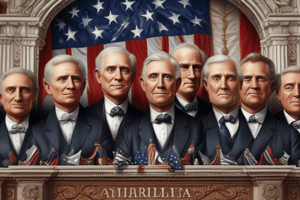Podcast
Questions and Answers
What was the term used to describe the presidency of Nixon?
What was the term used to describe the presidency of Nixon?
- The Authoritarian Presidency
- The Democratic Presidency
- The Imperial Presidency (correct)
- The Republican Presidency
What was the reason for Nixon's impounding of funds for federal programs?
What was the reason for Nixon's impounding of funds for federal programs?
- He opposed the programs (correct)
- He wanted to reduce national debt
- He wanted to increase his popularity
- He wanted to improve the economy
Who were the key advisors that helped Nixon direct White House policy?
Who were the key advisors that helped Nixon direct White House policy?
- Haldeman, Ehrlichman, and Kennedy
- Ehrlichman, Mitchell, and Kissinger
- Haldeman, Mitchell, and Agnew
- Haldeman, Ehrlichman, and Mitchell (correct)
What was the goal of the 1972 break-in at the Democratic National Committee HQ?
What was the goal of the 1972 break-in at the Democratic National Committee HQ?
Who was the leader of the group caught breaking into the Democratic National Committee HQ?
Who was the leader of the group caught breaking into the Democratic National Committee HQ?
What was the response of the White House to the Watergate allegations?
What was the response of the White House to the Watergate allegations?
Why did the Watergate scandal initially receive little interest from the public and media?
Why did the Watergate scandal initially receive little interest from the public and media?
Who helped the Washington Post uncover the Watergate scandal?
Who helped the Washington Post uncover the Watergate scandal?
Study Notes
President Nixon's Expansion of Power
- The executive branch was considered the most powerful branch of government when Nixon took office.
- Nixon believed the president should be above the people, and he expanded the power of the presidency with little regard for constitutional checks and balances.
- He impounded funds for federal programs he opposed and ordered troops to invade Cambodia without congressional approval, contravening the Constitution's division of war power between the president and Congress.
The President's Inner Circle
- Nixon relied on a small, loyal group of advisors, including Haldeman, Ehrlichman, and Mitchell, who had played key roles in his 1968 election victory.
- These advisors shared Nixon's desire for secrecy and consolidation of power, leading critics to accuse them of thinking they were above the law.
The Watergate Scandal
- In 1972, Nixon's campaign team sought to gain an advantage by breaking into the Democratic National Committee HQ at the Watergate complex in DC.
- Five men, including former CIA agent and security coordinator for the Committee to Reelect President, James McCord, were caught and planned to take photos of documents and install bugs on office phones.
- The press uncovered links between the burglars and the White House, but the administration denied allegations.
The Cover-Up
- The White House attempted to cover up the scandal by shredding documents, asking the CIA to urge the FBI to stop investigations on national security grounds, and paying the burglars for their silence.
- The Washington Post, with the help of a mysterious inside source, was the only media outlet to dig deep into the scandal, uncovering links between administration members and the burglary.
Studying That Suits You
Use AI to generate personalized quizzes and flashcards to suit your learning preferences.
Description
This quiz explores President Nixon's expansion of presidential power, his disregard for constitutional checks and balances, and his actions during his presidency.




